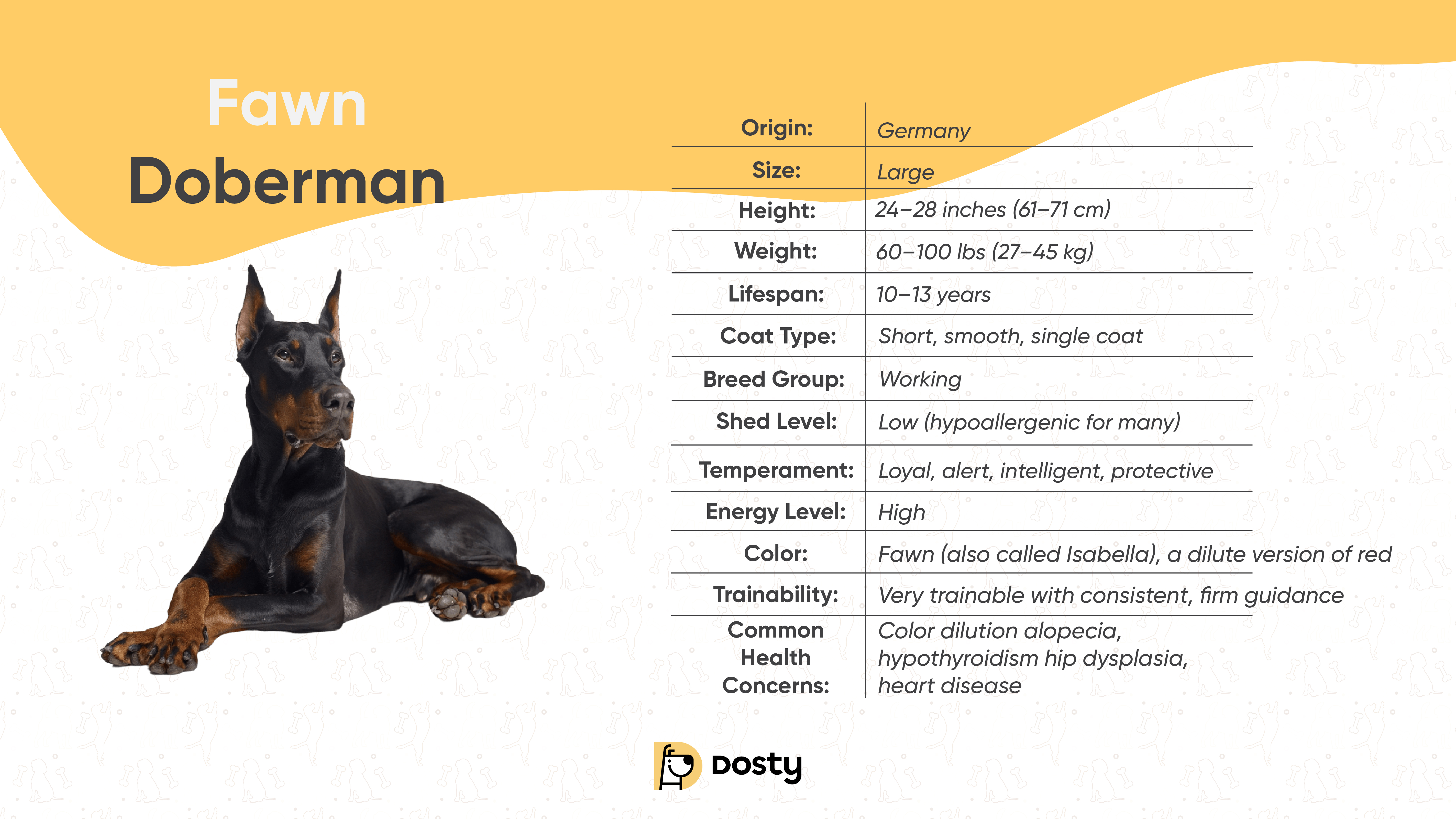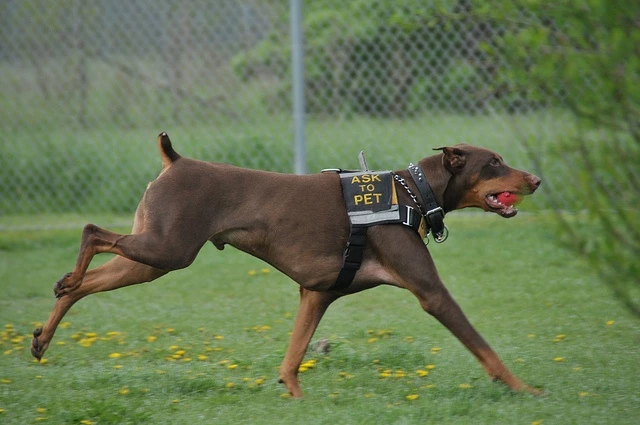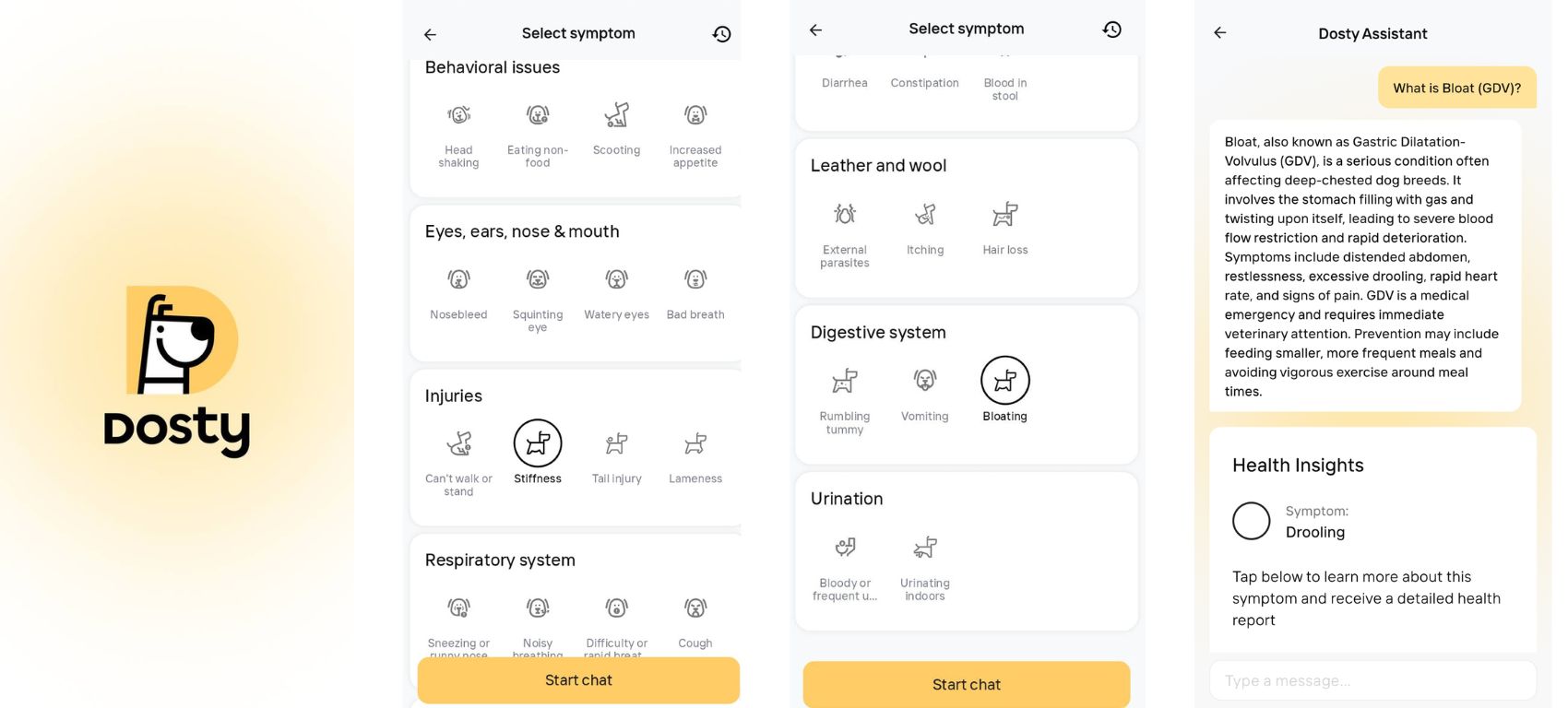On this page
Do Fawn Dobermans Have the Same Temperament as Standard Dobermans?
No, Fawn Dobermans do not have identical temperament to the standard Doberman, even though they share many of the key traits. They share those same traits with the black, red, and blue varieties - intelligence, loyalty, and protectiveness. Because of the mix of genetics they carry, some Fawn Doberman owners say these dogs are slightly softer with their temperaments and tend to be less dominant than their standard-colored counterparts.
Although they still have protective instincts, they may be sensitive to correction and environmental adjustments. What this translates to is that they need positive reinforcement training and a structed socialization program that is going to help them build their confidence along with proper manners. But they're just as trainable, athletic, and companionable as any other Doberman.
Dobermans are one of the most intelligent and obedient dog breeds, according to PetMD, but each individual does vary based on genetics, socialization, and training methods used.

About Fawn Doberman
The Fawn Doberman is a unique color variety of the Doberman Pinscher, which originated in Germany in the 1890s through selective breeding by Karl Friedrich Louis Dobermann. They were bred selectively by crossing Rottweilers, Greyhounds, German Pinschers, and Weimaraners to create a working dog that was loyal, intelligent, and protective.
Originally bred for guarding, personal protection, and police work, the breed is one of the most trustworthy security dogs today. That colour itself is called “fawn”, and is found as a result of a dilution of the red gene (dd), which restricts the amount melanin produced from each melanosome, resulting in a light brown or beige coat.
Despite their unusual color, Fawn Dobermans retain the same high intelligence, trainability, and protective instincts as standard-colored Dobermans. However, they may have slightly milder temperaments and require extra care due to their sensitive coat and skin.
💡 Quick Facts About Fawn Dobermans

The American Kennel Club (AKC) describes Dobermans as very trainable and oriented toward protection, obedience, and companionship. With adequate care and socialization, Fawn Dobermans can do well as family and working dogs.
What Makes Fawn Dobermans Different?
The main difference between a Fawn Doberman and other standard Dobermans is the genetic coat dilution. The fawn color comes from a recessive dilution gene (dd) that lightens the red pigment, resulting in a pale tan or beige coat.
🛡️ Differences in Fawn Dobermans:
- The diluted version results in a lighter-colored coat.
- Increased risk of skin conditions like Color Dilution Alopecia (CDA).
- Ineligible for show competitions in certain kennel clubs.
- A slightly milder personality that makes them' suitable to family life.
Their coat color may make them unique, but it also means they need to be specially cared for to prevent skin irritation. Regardless, Fawn Dobermans are just as intelligent, hard-working, and trainable as any other Dobermans.
Are Fawn Dobermans Smaller than Standard Dobermans?
No, Fawn Dobermans are not smaller than standard Dobermans. They follow the same breed standards and height ranges and weights. Some Fawn Dobermans may be leaner than others, due to skin conditions such as Color Dilution Alopecia (CDA) which is characterized by hair thinning.
📏 Size Comparison Table for Fawn Dobermans:
_1744287930.webp)
Are Fawn Dobermans Good Family Dogs?
Yes, Fawn Dobermans can make great family dogs with proper training and socialization. They are friendly, playful and loyal, which makes them a perfect companion for both kids and adults. Being watchful by nature, they will instinctively protect their home and family.
Why Fawn Dobermans Are Great for Families:
Very protective – protectively guards loved ones.
Faithful and devoted – forms close bonds with family members.
Playful and energetic – enjoys a lively environment.
Structured training – it needs clarity in rules and command.
Because you can shape a Doberman's temperament with training from an early age, they can possess ideal family traits, reports The Doberman Diversity Project.
Do Fawn Dobermans Get Along With Kids and Pets?
Yes, Fawn Dobermans can be great for kids and pets – if raised with the right leadership and early socializing.
Their affectionate and loyal nature means they often become very bonded to kids in the home. They’re playful, alert and love family interaction, making them a good fit for households with active children. That said, because of their size and energy, supervision is essential - especially around toddlers - to avoid accidental bumps during play.
Fawn Dobermans get along fine with other pets as long as the pets are introduced at a young age. They tend to get along well with other dogs, particularly if they have comparable energy levels. However, because of their natural prey drive, whatever smaller animals are kept in the home, such as cats or rabbits, must be introduced carefully and supervised.

Tips for Raising a Fawn Doberman with Kids and Pets:
- The earlier you can start socialization (ideally it happens in puppyhood), the better!
- Instruct children to respect the dog’s space, especially when eating or resting.
- Establish boundaries with smaller pets and use positive reinforcement to reward calm behavior.
- Excessive energetic behavior from boredom can be avoided with sufficient physical and mental expenditure.
How to Train a Fawn Doberman?
Training is very important aspect of Fawn Doberman. While they are very trainable because of their intelligence, eagerness to learn, and willingness to please, their sensitive nature makes them resistant to harsh corrections. It’s important to set firm leadership, regular routines and socialization in order to develop a well-balanced and confident dog.
❗ Training a Fawn Doberman can be a guessing game, too soft, and they ignore you, too hard, and they shut down.
With Dosty’s training videos tailored for sensitive breeds, you’ll receive guidance that truly works, with no stress or second-guessing.
📲 Keep it simple for both you and the dog. Try Dosty today.
Key Training Features for Fawn Dobermans:
- 🐶 Get an Early Start: Basic obedience training should start as early as 8 weeks old to take vessel discipline.
- 🦴 Positive Reinforcement: Use treats, praise, or play to reward good behavior.
- 🚫 Do Not Punish Too Much: They could be afraid or anxious due to strict correction.
- 👫 Socialization is Key: Expose them to a variety of environments, people, and animals in order to mitigate aggression or fearfulness.
- 🏃Exercise their mind & Body: Use obedience exercises, agility training & puzzle games to avoid ennui.
- 🔗 The key to leash training: Teaching them how to walk nicely on the leash helps keep their powerful instincts in check.
- 🛑 Compulsory rules: By establishing rules ahead of time, bad habits do not arise.

Do Fawn Dobermans Have Health Issues?
Yes, fawn Dobermans are susceptible to specific health issues, especially those related to their coat, skin, and genetics. The disqualification of fawn is due to a recessive dilution gene (dd), which causes their unique nanomorph coloration but also makes them susceptible to skin disorders and a host of other genetic health issues.
Common Health Concerns in Fawn Dobermans
❗ Fawn Dobermans are particularly prone to skin, heart and joint issues — but signs aren’t always easy to spot.
Dosty’s AI Assistant shares vet-backed insights customized for your pup’s breed. With Symptom Checker, monitor health changes and identify potential causes quickly.
📲 Get Dosty to track your Doberman’s health.
Are Fawn Dobermans Prone to Skin Problems?
Yes, Fawn Dobermans are highly prone to skin conditions, mainly because of their diluted coat color and absence of protective melanin. They are prone to many health issues, including Color Dilution Alopecia (CDA), the most common, which results in hair loss and flaky skin as well as increased sensitivity to environmental factors.
🩺 Signs of Skin Issues in Fawn Dobermans:
- Dry, itchy skin – New scratching and itching.
- Hair loss or bald patches – Usually on back and sides
- Sunburn sensitivity – Light-colored fur provides less protection from ultraviolet rays.
- Allergic responses – Hypersensitive to dietary and environmental allergens.
- Infections on the skin – Due to compromised skin barriers, bacterial and fungal infections.
Is your Fawn Doberman struggling with dry skin, bald patches, or scratching❓ These symptoms may not be a case of allergies.
Thanks to Dosty’s Symptom Checker and AI Assistant, you can detect possible problems such as Color Dilution Alopecia in its infancy and receive individualized guided insights on your dog’s situation.
📲 Download Dosty to manage your dog’s skin health with clarity and confidence.
How to Care for a Fawn Doberman’s Coat?
Due to their short, fine coat and genetic dilution, Fawn Dobermans require special grooming care to prevent skin irritation, dryness, and hair loss. Unlike darker-coated Dobermans, they have less natural protection against sun exposure and environmental factors, making proper coat maintenance essential.
🛁 Fawn Doberman Coat Care Guide:
⚠️ Avoid over-bathing, as it can strip the skin of essential oils, leading to excessive dryness. Instead, focus on moisturizing treatments and balanced nutrition to keep their coat healthy.
❗ Fawn Dobermans have specific grooming needs and missing just one step can result in dry skin, sunburn, or loss of coat.
This is where Dosty really makes a difference.
With Dosty, you have expert-backed grooming videos, product suggestions, step-by-step routines for brushing, bathing, nail care, and more - specifically ticketed to your dog’s needs.
📲 Download Dosty now to make coat care simple, safe and stress-free.
FAQs About Fawn Dobermans
1. Is lifespan shorter in Fawn Dobermans?
Nope, they usually live 10–13 years, same as regular Dobermans. But skin-related health concerns you have to be careful with and need monitoring.
2. Are fawn Dobermans more aggressive?
No, they are not more aggressive than regular Dobermans. But with little or no training and poor socialization, it can be overly dominant.
3. Сan Fawn Dobermans join the working dog ranks?
They can guard, protect, and do police work, but their skin is fragile, and they may not be able to work outdoors in cold, heat, or rain.
4. Is it a common practice to maintain a special grooming for Fawn Dobermans?
Yes, their short, fine coat is susceptible to skin diseases. They require gentle brushing, skin care and sun protection to thrive.
Conclusion
Fawn Dobermans share the same intelligence, loyalty, and protective instincts as standard Dobermans but require special care due to their unique coat and skin sensitivity. Their gentle temperament makes them great for active families and experienced handlers.
Providing proper training, diet, and grooming ensures they thrive both physically and mentally. With the right care and socialization, a Fawn Doberman can become an exceptional family companion or working dog.
🐾 Now learn more about Doberman Tips Here!




